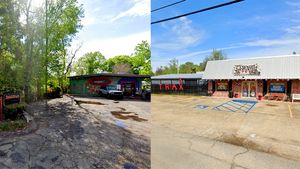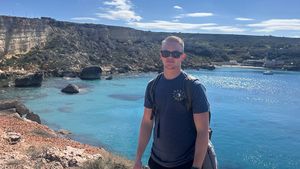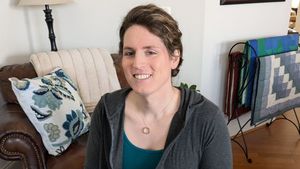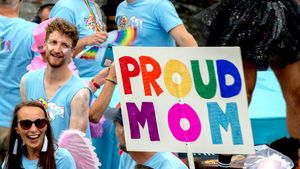I am queer. I amtrans. I am an immigrant. I am a survivor.
As a queer and marginalized therapist practicing in the U.S., I am hearing a wide variety of human responses to the unfolding increases in oppression and discrimination orchestrated by the new federal government regime. To promote solidarity and inspire resilience, I've gathered some ideas that I've found helpful in my process.
A seemingly innocuous Sunday luncheon of dainty drinks over bougie donut holes with my trans-chosen siblings inspired this prose. "Holes with the Hoes" comes to mind as I write this. My two closest confidantes begin discussingthe current events and their reactions—the quality of the energy at the table shifts. Tension, urgency, and unease waft through the open-air cafe.
One of them, adopted from a foreign country by American citizens, expresses genuine concern over citizenship. Terror and shock pulse unevenly through my body as the thought flashes, "Oh no, will they be next?" My stoic facade hides the inner tides. They go on, "Did you hear about the trans woman who had her passport and all official documents taken?" I can feel the heat and pressure as the urge to flee clashes with the desire to hide. She looks me square in the eyes, "Gettys, didn't you say months ago you know that there arepeople that want to kill trans people in this country?" The tide of uncertainty lifts me off my feet. Like water piercing through marble, terror cracks right through the hardened center of me.
Growing up in rural Europe and the Deep South of the U.S. as a millennial, there is no doubt that these people exist. I've met them and lived with them. I've sat in church, school, and community gatherings with these people. They look like you and me. I reluctantly find myself nodding. "Well, they're in power, and it's happening now, Gettys," she exclaims in a tone as clear as a tornado siren. The paucity of words in my mind leaves me dangling. My other bestie's words, "Gettys, haven't you heard the saying about the Holocaust? The pessimist left early and survived while the optimists stayed and died."
Those words are the final blow. Something shatters deep within me in a place that's hard to describe and ignore. First, as a trickle, something begins to emerge from the rending. They both go on to recount their recentdiscussions with other queer community members determining their exit strategies to Europe and abroad. The trickle builds into a wave that lengthens my spine with its unstoppable crest. My cognitive mind attempts to reason away from the erupting torrent of sensation and energy to unsuccessfully maintain social norms of polite conversation.
It's been weeks since that conversation. A process within me is underway, which is difficult to explain—maybe even more so. I love these people and can't imagine facing the coming trials without them. I stand today because of them. They are my nurturing roots. The churning within is amplified by sirens, chanting, and marching through the neighborhood all week.I cannot remain silent.
I find the original, albeit macabre, aforementioned aphorism, "In the 30s, the pessimists went to New York, and the optimists went to Auschwitz." The impact is a weight that could pull me through the floor. Persisting, I uncover a couple of more emboldening ideas. One prisoner of war discussing how he coped and survived said, "You must never confuse faith that you will prevail in the end – which you can never afford to lose – withthe discipline to confront the most brutal facts of your current reality, whatever they might be." The inner tsunami starts to take shape as I read his words and consider the difference between optimism, pessimism, and faith.
Faith has a bad rapport with marginalized communities. Trust me, I know. I survived six years of faith-based Christian "reparative therapy" in the Deep South during my sexual peak. Yet, I can't help but maintain faith, not in a god or religion, but in our community (or whatever feels true for you)—faith in our community's resilience, perseverance, and prevailing. I don't know how or when, but we will prevail.
Pain, loss, violence, cruelty, brutality, and hatefulness have always been a part of our communities' experiences. We will lose, we will hurt, we will grieve, but they cannot take our faith that we will prevail. I urge you to light the fire of faith in our resilience inside you. Stoke the flames with me as we gather, close rank, and bind ourselves to each other. Yes, there is terror and horror; let it draw us together to share and deepen our roots as the wind strengthens the trees. They can take our rights and pretend we don't exist; they can break up our families and take our safe places, butthey can't take our hope, our knowing, or our faith.
To those who feel the urge to flee, I understand. I fled the southeast to escape the xenophobia and racism, seeking refuge in Denver. Here, I've found my roots, my people, my community. Running to find a safe shelter away from darkness is a way to keep your light.
However, this is not the way for me. I cannot flee. I am you, and you are me. We are a community whose strength comes from solidarity. With mountains and trees as our witness, we will remain and persist. We will resist and sing our songs of pain and loss together as those who have come before us. Our ancestors lived on and were bound to each other. We will persist and persevere. We will endure and earn our greys to stand as living tributes tothe resilience of our marginalized community and to stand as elders.
Just as the trees do, so shall we.
Trained in transpersonal psychotherapy, Gettys LPCC is a queer somatic therapist serving marginalized communities. They are devoted to exploring the mysteries of the mind-body connection and are passionate about elevating the LGBTQ+ community through mindful awareness.Gettys lives in Denver with their partner and their pets, Oberon and Bodhi. You can learn more about their work here.
Voices is dedicated to featuring a wide range of inspiring personal stories and impactful opinions from the LGBTQ+ community and its allies. Visit out.com/submit to learn more about submission guidelines. We welcome your thoughts and feedback on any of our stories. Email us at voices@equalpride.com. Views expressed in Voices stories are those of the guest writers, columnists and editors, and do not directly represent the views of Out or our parent company, equalpride.

























































































